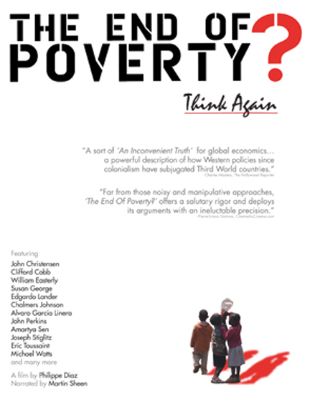
Writing a negative review of a documentary on world poverty is akin to booing Santa Claus at the Thanksgiving Day parade, but The End of Poverty? does not present many exemplary qualities for a stringent critic to applaud. In the end, the film is an informative experience, and people will definitely emerge from the theater a bit smarter than when they entered, which is more than can be said of the vast majority of cinematic fare these days. Director Philippe Diaz and the producers have assembled a sporadically compelling PBS-style history of poverty which clarifies a great deal about how the gap between the haves and the have-nots has become so appallingly wide. Experts such as Nobel Prize winners Amartya Sen and Joseph Stiglitz, economic "hitman" John Perkins, and political science guru Chalmers Johnson provide prescient information revealing how the three C's of global oppression (colonialism, capitalism, Christianity) have enacted and supported economic patterns which absolutely ensure that former colonies will remain the equivalent of indentured servants to their former occupiers.
Unfortunately, almost none of these great minds are asked to expound on how these afflicted nations might possibly escape from these entrenched patterns in the future. The information is almost entirely historical, and it is piled on in such quantity that even the most altruistic viewer is left with a grim cynicism that poverty is the result of an impaired economic system which will remain impervious to individual attempts at counteraction. By the time an expert named Clifford Cobb, who happens to be the film's executive producer, finally gets around to (briefly) outlining a plan for trying to rectify more than 500 years' worth of brutal economic subjugation, the seed has been drowned by a deluge of history and statistics. Also, while the filmmakers provide detailed coverage of several impoverished nations in South America and Africa, Asia is mysteriously absent from their analysis. In particular, it certainly would have been relevant to consider the complex and extraordinary case of South Korea, in order to examine how a war-torn third-world nation somehow transformed itself into a financially solvent world power in little more than 50 years. Despite these problems, the film deserves to be seen, and if every person in America paid to see The End of Poverty? rather than Saw VI, the world would benefit immeasurably.
